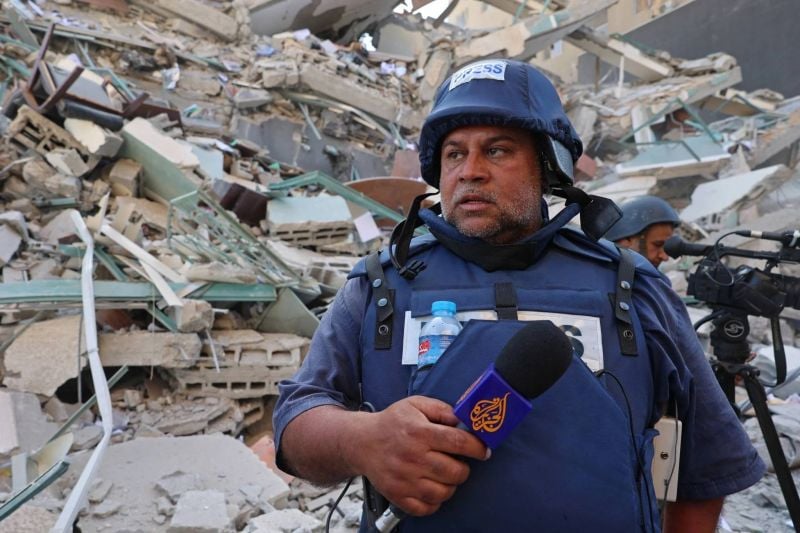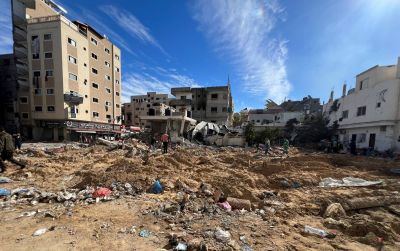
Al Jazeera journalist Wael al-Dahdouh near the rubble of the Jalaa Tower, after an Israeli airstrike on the building that housed the offices of the Qatari news channel in the Gaza Strip, May 15, 2021. (Credit: Mohammed Abed/AFP)
On Sunday, Jan. 7, another son of Wael Dahdouh, who was also a journalist for Al Jazeera, was killed by an Israeli strike. Read L'Orient-Le Jour's profile of the Qatari channel's Gaza bureau chief.
He is one of the most emblematic faces of Gaza.
In many ways, Al Jazeera journalist Wael al-Dahdouh — who has been reporting from inside Gaza since the onset of the Israeli siege on Oct. 8, 2023 — carries the voice of his people.
He’s faced a series of personal tragedies in the last several weeks, including the death of his wife and children in an Israeli airstrike and being severely injured himself in a different strike. But still, he continues to cover the conflict.
Just two days. That's all the time it took for Dahdouh to pick up his press jacket and microphone after narrowly escaping with his life. On Sunday, with a bandage on his wrist, he reappeared on screen to provide live coverage from inside Gaza.
Two days earlier, Dahdouh was reporting from inside a school in the city of Khan Younis, in the southern Gaza Strip, when an Israeli drone attacked the school.
Shrapnel from the blast struck his right hand and waist, and he was transferred to Nasser Hospital for treatment, according to the Committee to Protect Journalists (CPJ). His colleague, Samer Abou Daqqa, was killed in the incident.
Dahdouh spoke at Abou Daqqa’s funeral the next day: “All friends and colleagues of Samer are behind him and continue this noble message, even if more than 80 of our colleagues and their families have been killed, we will continue to do our job and cover the news.”
'A real hero'
A few weeks earlier, on Oct. 25, Wael al-Dahdouh face first became known to the world. He was on air when he learned that his wife, his two children — aged seven and 15 — and his one-and-a-half-year-old grandson were killed by an Israeli airstrike on the Nuseirat refugee camp, where his family had taken refuge after evacuating northern Gaza.
The correspondent had moved his family to the camp because he believed they would be safe there. located in the area to which Israel had ordered residents of the northern enclave to evacuate. A few minutes later, looking distraught, Wael al-Dahdouh, surrounded by cameras, collapsed on the body of his son in the al-Aqsa Hospital in the city of Deir al-Balah.
“He lost his wife, his son, his daughter, his grandson and his colleagues and was himself seriously injured during an Israeli airstrike. Despite all this, he continues to go to the front line,” Lebanese human rights activist Mohamad Safa posted on X. “This man is a true hero. Thank you, Wael.”
A few days before his injury, the journalist was comforting a young Palestinian girl who had been amputated following an Israeli strike. "No matter the pain and fatigue one faces, they must be overcome. This is our life, this is our land, and there is no other place than here, he told her. We have no other choice. If God wills it, our Almighty Lord will save us from this war and we will be able to return home and make a fresh start."
First Intifada
Born in 1970 in Zeitoun, the oldest neighborhood of Gaza, Dahdouh grew up in a large family.
The young high school student dreamed of becoming a doctor, he would later tell Middle East Monitor, but this came to an end with the First Intifada, which lasted from 1987 to 1993.
One year after the outbreak of the Intifada, he was arrested by Israeli forces and sentenced to seven years in prison for his involvement. “Prison brought me a lot. It turned me from a hasty, enthusiastic and simple boy into a conscious, educated man aware of many life’s problems,” he said in an interview published in 2021 by the Middle East Monitor. “This set me apart from my friends of the same age.”
Dahdouh said he was prevented by Israeli forces from continuing his studies outside the Gaza Strip. And so he chose to study journalism “because there was no medical faculty in Gaza at the time,” he told Middle East Monitor. “I also found that journalism was closer to my personality, with the message that journalists must convey in the shadow of the occupation.”
The young man began his career at the Palestinian daily Al-Quds and then, during the Second Intifada of 2000-2005, worked as a correspondent for the Voice of Palestine station, co-founded in Ramallah by Al Jazeera reporter Shirine Abu Akleh, who was killed on May 11, 2022 by an Israeli sniper bullet to the head during a raid in Jenin.
Dahdouh collaborated with other media before joining Al Jazeera in 2004 and becoming one of the most well-known journalists in Gaza.
‘Reality of life in Gaza’
His coverage of the deaths of prominent Palestinian figures such as Ahmad Yassine, the founder of Hamas assassinated by Israel in 2004, and the successive wars waged by Israel in Gaza contributed to his fame.
On May 15, 2021, in the midst of that year’s war in Gaza, Dahdouh spoke in front of the ruins of the Jalaa tower — which housed the offices of Al Jazeera and the Associated Press — destroyed in an Israeli army strike: “If Israel wanted to prevent media coverage of its attack, it was mistaken. It did not succeed. On the contrary, it attracted even more attention.”
During those 11 days of relentless Israeli bombardment on the Gaza Strip, Dahdouh’s family had survived an attack on a neighboring house, he told Al Jazeera at the time. He had stated that his relatives were spread out among the homes of several family members, “in the hope that some of them would stay alive; that's the reality of life in Gaza.”
“It is sometimes difficult to concentrate on the task at hand because we are not reporting on a war in a foreign country,” he told Middle East Monitor in 2021. “The bombs are falling on our homes and offices. It is not easy to stay focused when you are wondering if one of your loved ones has been killed or injured.”
This article was originally published in French in L’Orient-Le Jour.


